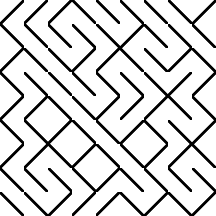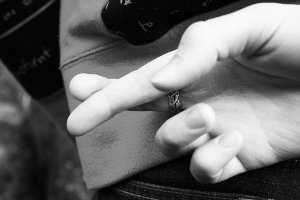“One can be the master of what one does, but never of what one feels.”
– Gustave Flaubert
Category: Psychology and personal development
Articles on psychology, Asperger, ADHD, cognitive science, personal development, mindfulness and acceptance, tips and theories.
Do you avoid falling or do you know how to land on your feet?
Roughly speaking, people can be divided into two groups: Those who learn how to land on their feet, and those who avoid falling.
If you’re like me, and like having a firm grip on things, you might, just like me, find you’re very uncomfortable around people that likes to “fall” all over the place and enjoy their ability to land on their feet even after the most horrible “falls.”
Without getting lost in details I might add I once managed to start a business with a “faller”. Guess who landed on their feet and who landed on their head?
So, it actually all comes down to an old truth:
Birds of a feather flock together.
And if you’re a tree dwelling… non-flying… uh, chimp? :D… avoid flocking with birds regardless of their feathers 😀
On Communication: When the other person isn’t there
“When the other person isn’t there, sometimes we tend to make up their side of the conversation, which truly isn’t fair to either one of you…”
/Pretty Little Liars
Failing is not a failure

When we are failing, we’re not necessarily having a failure. If we view the failure as a successful attempt to find one way success cannot be achieved, then each failure brings us closer to success. Or as Thomas Edison put it, when asked how he managed to go on after having failed to create a light bulb for the 10 000th time:
“I have not failed. I’ve just found 10,000 ways that won’t work.”
– Thomas A. Edison
Think of life as a labyrinth. There are numerous choices to be made, left or right turns to take, and each choice can end up in a dead end or take us closer to the exit of the labyrinth.
Whenever we reach a dead end, if we take time to observe the situation and note how we got there, even though we’ve just experienced a failure, this failure can help us get closer to the successful solution, if we remember the failing path taken.
How failing takes us closer to success
As the example with Thomas Edison suggests, trying to reach a goal an insane number of times is not insane, if each attempt is slightly different. Thomas Edison would not have been celebrated as the inventor of the light bulb if he had tried the exact same procedure for 10 000 times, then he would have been considered… well let’s just say he would have been considered very odd and unusual.
On the other hand, it’s important to really find out what failed and what just happened at the same time as the failure. One way to avoid failing to create a light bulb is to never try again after the first failure, however, since Thomas Edison did invent the light bulb, that approach would have been a failure … at least when it comes to inventing the light bulb.
Life is complex
The above quote from Thomas Edison, and the story about his 10 000 attempts to invent a light bulb doesn’t reveal what his family and friends thought when he kept trying. Perhaps they thought he was insane and finally distanced themselves from him, and his insistent search for the light bulb might have turned his family life into a failure. (I actually have no clue what Thomas Edison’s family life was like!)
This is a more tricky problem, because life isn’t just about one single path or problem. Life is a whole weave of different things going on at the same time, colliding, conflicting, and sometimes, when it feels like the forces of the Universe is on our side, they may even cooperate towards the same goal.
The good news is that if we apply the same attitude towards failure to make the whole life puzzle fit together, failing to make ends meet or giving all important people in your life the energy and attention they need or deserve only means you have to change the plan a bit.
The failure is just another successful proof of how it cannot be done.
The man who can keep a secret may be wise…
“The man who can keep a secret may be wise, but he is not half as wise as the man with no secrets to keep.” /Edgar Watson Howe
—-
Life is a trial with errors…
“Life is a trial with errors…”
…so the best thing you can do is to learn to live with the trials and errors and then it doesn’t matter that there are trials and errors… because you’re still living life 😀
Oh, and yes… that quote is a bit funnier than just a simple “live life by trial and error”. I couldn’t help myself so I was funny and made life into a trial with errors… but my message is still valid!
If it’s not important that life is hard, then life being hard wont keep you from living it to the fullest extent in which you are able under your circumstances.
It’s your life! No one can take that from you unless they commit a heinous crime. If you’re alive, you have a life… it’s that simple.
Sleep Deprivation, effects and my personal treatment

Sleep deprivation has been (is) a norm in my life since I started school, mostly because school meant having to get out of bed to go somewhere long before I was ready to get out of bed.
For a long time I saw it as something normal. I would sleep 4-5 hours in the weekdays and then catch up in the weekends. However this routine did not always work out that smoothly. I almost got flunked in high-school for missing way too many morning classes. It also turns out, science has more or less proven that sleep deprivation isn’t at all healthy for you…
Continue reading Sleep Deprivation, effects and my personal treatment
Behind every success
There is at least one failed plan behind every success.
Mindfulness at the dentists and other “problematic” places
I had a dentists appointment this morning, and I thought it would be a nice place to try some mindfulness.
I figure you’ve basically two main strategies here. Either use mindfulness to distract yourself by focusing on some place other than your teeth (e.g. Your feet), or focus on what’s happening with your teeth here and now.
I should mention that there was no drilling involved in this visit, but I usually has a lot of tartar that needs to be scraped off, and I have very sensitive dental necks, so it’s usually not a walk in the park.
I started to focus on what the dentist (or actually hygienist) was doing with my teeth, and I very quickly noticed that it seemed to hurt more if I lost that focus. When I really experienced the things she did to the teeth with a kind of curious interest the pain became much more tolerable.
I think for two reasons: I was really there, feeling what was happening, not what I anticipated would happen, and I accepted what was happening – it was almost as if I was involved in the actual “poking around.”
I am suspecting this technique can be used in a lot more situations than at the dentists, and using mindfulness and acceptance in those situations, I think a lot of things we feel are intolerable, might actually be both tolerable and even interesting…
